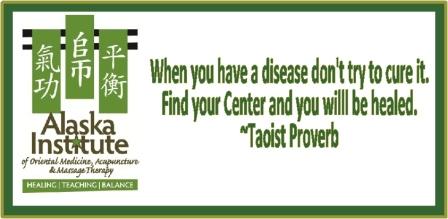Post-Trauma Stress from
Emotional Aftershocks of Earthquakes
by Katherine Minder
I have lived in Alaska for 40 years and I am no stranger to earthquakes, but on the morning of November 30th, 2018 my experience of earthquakes changed. After a minute and a half of shaking at a magnitude of 7.1, it looked like someone had turned my house upside down and shook it. My foundation was cracked, literally and emotionally, and I stood braced up against my entryway wall in the dark, calling my sons to make sure they were all okay. For the next hour, and through the aftershocks that followed, I stayed frozen against the wall experiencing my own forms of emotional aftershock.
At the Oriental Healing Arts Center, I witnessed people coming in seeking help for symptoms that ranged from not being able to relax or sleep, being on high alert, confusion, loss of mental clarity, difficulty making decisions, headaches, fear and anxiety, nightmares, tiredness, and mood swings, all symptoms of post trauma stress.
The article named “Self Help for Post-Traumatic Stress,” in Psychology Today talks about cognitive behavioral therapy, a type of talking, that combines cognitive and behavioral therapy. Drug therapy, which does not treat the root of the symptom, so symptoms reappear when the drug wears off. Also listed were therapies called, “cognitive processing, prolonged exposure, and virtual reality therapy,” which according to Psychology Today, is where “the client relives past traumas in an attempt to extinguish the negative emotions associated with the traumatic experience.” (Sword, Rosemary K.M. and Zimbardo, Philip PhD)The article goes on to tell about the birth of mental health apps for the self-help population. A new app that is available for between $8- $15 a month called Happify, is referred to as a 4-week solution, based on cognitive behavioral therapy for anyone with post-traumatic stress symptoms. It claims that 86% of users saw happiness improvements in 2 months.
“The Earthquake People” in Psychology Today talks about how psychotherapy is at a loss when it comes to “making us feel safe” and points us toward perspective instead. It states, “We are all earthquake people, who interact not only with each other but with forces far greater than ourselves, far greater than humanity.” It goes on to say, “These forces should not only humble us, they should focus us. The presence of these great forces beneath our feet, in our seas, in our skies, is like a voice telling us in no uncertain terms to live this day, to open our hearts in this moment, to be guided by our deepest feelings not on the weekend, or on our vacation, or next year sometime, or when we retire, but in this very hour.”( Ventura, Michael)
I chose a different route in dealing with the emotional aftershocks I experienced from the earthquake. I went with treatments of acupuncture to reset my nervous system. After each treatment I felt calm, relaxed, and more emotionally balanced. I also got massage, to help release those lovely feel good endorphins, with a little extra focus on my feet to help me feel more grounded. I prepared as much as I can for the things I have no control over, chose natural treatments like massage and acupuncture that I feel work well, and the rest for me is in the perspective of choosing faith over fear.
If you are feeling post trauma symptoms from the earthquake and aftershocks, ask yourself what the best resources and tools would be for you to move on and heal from these symptoms. If you lean toward a self-help app or talk therapy, you may consider mixing it with massage, acupuncture, energy healing or all the above, but whatever you choose, know that you don’t have to live with post trauma stress, and you are not alone in feeling these symptoms.
Works Cited:
Ventura, Michael. “The Earthquake People.” Psychology Today May 1994 Reviewed June 2016
Sword, Rosemary K.M. and Zimbardo, Philip PhD. “Self-Help for Post-Traumatic Stress.” Psychology Today June 2018




